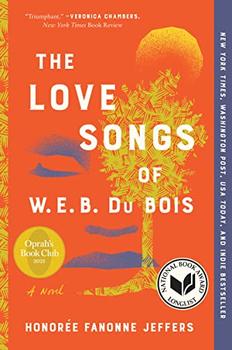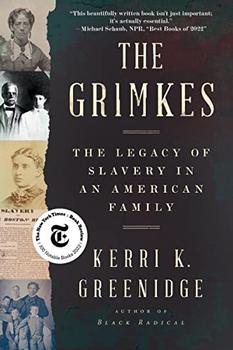Summary | Excerpt | Reading Guide | Reviews | Beyond the book | Read-Alikes | Genres & Themes | Author Bio

Honorée Fannone Jeffers' The Love Songs of W.E.B. Du Bois explores the Black experience in America through the lens of a middle-class girl and her family. Ailey is the youngest of three daughters born to Belle and Geoff Garfield, and we meet her when she is just three years old. Through her first-person account, we watch her mature from naïve child to confident and capable young woman, sharing her joys, sorrows, triumphs and failures along the way.
Although at its heart the novel is a coming-of-age story, that's not apparent until late in the book due to the various narrative techniques the author employs. A large and equally engaging portion of the story is historical fiction, following Ailey's ancestors from village life in Africa to their experiences being enslaved on a Georgia plantation and beyond. These sections have a mythic feel to them, their unnamed narrator weaving the early stories into the type of tale one might spin around a campfire. As the audience, we're aware that we're reading about Ailey's forebears, but their relevance isn't completely clear until the lineage catches up with what she knows of her family tree. Other chapters are relayed from the points of view of Belle and Lydia, Ailey's eldest sister. These third-person accounts fill in gaps in Ailey's knowledge while providing us with a comprehensive understanding of how she grows into the person we know at the book's conclusion. Love Songs contains an enormous cast, but all the characters' voices are unique and authentic — a truly remarkable feat.
Jeffers covers a wide range of topics throughout the novel, taking a finely nuanced approach to many of them. As one might expect, racism is a major theme: Some characters react to casual racism with anger or resentment, while others approach it as an annoyance — a day-to-day common occurrence to be expected and dealt with accordingly. The author also explores colorism within the Black community, where some seem to feel lighter-toned skin is more desirable. Another key theme centers on the sexual abuse of children and the ways such harm can manifest differently in individuals. The author additionally touches on subjects such as Black education, the importance of family (in particular, reverence for one's mother), marital fidelity, drug abuse, sexuality, interracial marriage and a host of other issues, some specific to the Black community, others universal.
I'd generally opine that when a work is this massive — over 800 pages — it perhaps would have been stronger had the author concentrated on fewer topics. But although Love Songs is big, sprawling and multi-faceted, there's not a sentence in it I'd have edited out. It's messy in the same way the experiences of most lives are messy — one goes through phases, finds romance, makes bad choices — but combine to form a whole. Jeffers brilliantly reflects these experiences throughout the novel, but her depiction of Ailey's growth in particular is perfect. That said, the book does require some patience and persistence, especially at first, when the reader has yet to become familiar with the characters (the family tree inserted at the front of the book is very helpful with keeping people straight).
I've found myself thinking about The Love Songs of W.E.B. Du Bois for many days after completing it, and consider it one of the most well-crafted, entertaining novels I've encountered in quite some time. I highly recommend it for readers who appreciate complex, adult themes and enjoy big, meaty generational stories. Book groups who are able to select a novel of its length will find it yields many great topics for discussion as well.
![]() This review was originally published in The BookBrowse Review in September 2021, and has been updated for the
May 2022 edition.
Click here to go to this issue.
This review was originally published in The BookBrowse Review in September 2021, and has been updated for the
May 2022 edition.
Click here to go to this issue.

If you liked The Love Songs of W.E.B. Du Bois, try these:

by Terah Shelton Harris
Published 2024
An explosive and emotional story of four siblings―each fighting their own personal battle―who return home in the wake of their father's death in order to save their family's home from being sold out from under them, from the author of One Summer in Savannah.

by Kerri K. Greenidge
Published 2024
A stunning counternarrative of the legendary abolitionist Grimke sisters that finally reclaims the forgotten Black members of their family.
Never doubt that a small group of thoughtful, committed people can change the world...
Click Here to find out who said this, as well as discovering other famous literary quotes!
Your guide toexceptional books
BookBrowse seeks out and recommends the best in contemporary fiction and nonfiction—books that not only engage and entertain but also deepen our understanding of ourselves and the world around us.